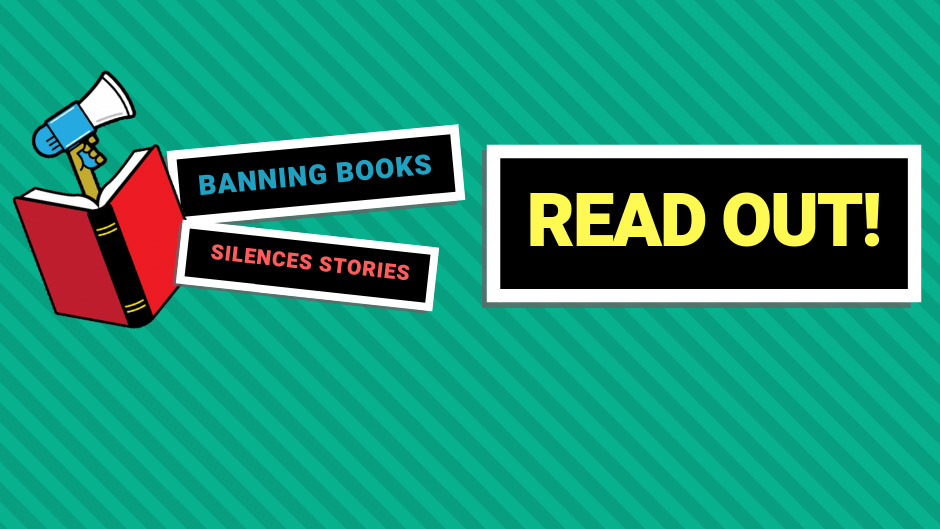How often do you think about your right to read? It is often said that words can change the world, whether they’re spoken aloud or written down. The First Amendment recognizes the power of words, enshrining our freedom of speech. But what happens when that speech is challenged? When we’re told that we can’t speak out, can’t read words that might challenge our thoughts or give us new ideas?
September 23 through 29 is Banned Books Week, a time of year designated to raise awareness of banned and challenged books and an opportunity to understand the consequences of censorship. The 2018 theme, "Banning Books Silences Stories," is a reminder that everyone needs to speak out against the tide of censorship.
Banned Books Week was originally founded in 1982 by Judith Krug in response to a sudden surge of challenged books. Krug, a First Amendment defender and library advocate, strongly opposed censorship. She felt that no one should be restricted from books or ideas, and that readers should have the freedom to develop their own opinions.
In the 36 years since Krug began her initiative, there have been more than 11,300 books challenged, according to the American Library Association (ALA). Last year 354 books were challenged, which is an upward trend from the previous few years. Some of the most frequently challenged books of 2017 included: Thirteen Reasons Why by Jay Asher, Drama by Raina Telgemeier, and Sex is a Funny Word by Cory Silverberg and Fiona Smyth. Books that involve topics of sexuality and religion often top lists of frequently challenged books.
If a book is challenged, someone is trying to keep it from the hands of readers. ALA’s Office of Intellectual Freedom has reported the top three reasons for a challenge are: 1) the material was considered to be sexually explicit, 2) the material was considered to have offensive language, or 3) the material was considered unsuited for any age group.
Challenges by various groups have resulted in books commonly regarded today as classic literature being banned from libraries and schools across the United States: In 1957 The Wonderful World of Wizard Oz was banned from the Detroit Public Library for “having no value for children of today, supporting negativism, and bringing children’s minds to a cowardly level.”
Other classic works that have been banned include:
- Harper Lee’s To Kill a Mockingbird, on the grounds of profanity and racially charged language.
- J. D. Salinger’s The Catcher in the Rye, described by detractors as a “filthy, filthy book.”
- First edition copies of Allen Ginsberg’s Howl were seized by the San Francisco customs for obscenity in 1957; however, after a trial the obscenity charges were dropped.
- John Steinbeck’s The Grapes of Wrath was temporarily banned in the region of California in which it was originally set for an “alleged unflattering portrayal of area residents.”
- The Diary of a Young Girl by Anne Frank was once banned by an Alabama textbook committee, deeming it a “real downer.”
ALA's Top Ten Most Challenged Books Lists
Banned Books Week at University of Miami Libraries
Banned Books Week highlights these and many other influential works that have endured censorship, bringing together proponents of free speech, librarians, publishers, teachers, and book lovers of all genres. This year’s events and exhibitions will highlight books and music written by or about marginalized groups and voices.
Join us in September for a week-long celebration of free speech and great literature! Starting September 23, look around the library for books that have been challenged or banned—some of the titles may surprise you.
Celebrate the “right to read!” with University of Miami Libraries (UML). On Tuesday, September 25 at 2 p.m., we will commemorate Banned Books Week 2018 with a Read Out of previously banned or challenged works. UML's Read Out will feature student and faculty speakers who will be reading selections from books by or about marginalized groups. Join us for this free event at the Flexible Program Space in the Learning Commons on the first floor of the Otto G. Richter Library.
Throughout the week, you can also view a selection of banned and challenged music at the Marta and Austin Weeks Music Library. An exhibit in the Music Library’s entrance will feature works by Beyoncé, John Lennon, Madonna, Queen, and Rage Against the Machine.
Check out our Guide to Banned Books Week to learn more about what happens when a book is challenged.
Exercise your right to read—check out a banned book from UML!

